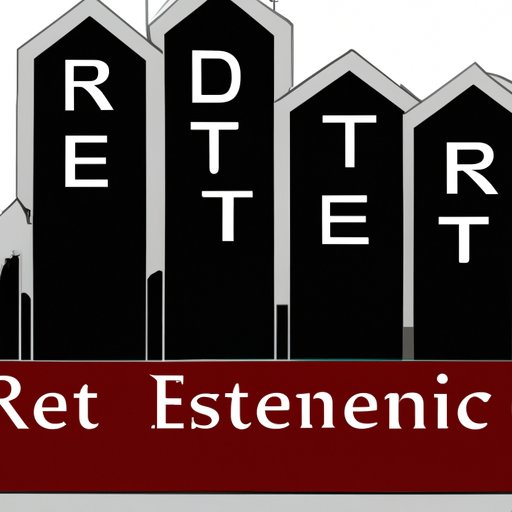Introduction
Real estate investment trusts (REITs) are a type of security that allows investors to invest in real estate without actually owning or managing any physical property. By pooling together funds from multiple investors, REITs can purchase or finance large-scale real estate projects such as office buildings, retail centers, apartment complexes, and hotels. As an investor, you can benefit from the income generated by these properties as well as any appreciation in value.
The COVID-19 pandemic has had a major impact on the global economy, including the real estate market. Many industries have been hit hard by the economic downturn, leading to decreased demand for commercial and residential properties. With so many unknowns in the market, it’s important to understand the potential risks and rewards of investing in REITs right now.

Analyzing the Current Market for REITs: Examining Trends and Investment Opportunities
Before investing in REITs, it’s important to understand the current trends in the real estate market. The pandemic has caused an increase in remote working and an overall decrease in demand for office space, while the hospitality sector has seen a drastic decline in occupancy rates. On the other hand, demand for single-family homes and rental properties has increased due to low interest rates and people seeking more space for remote work.
Given these trends, it’s important to identify the best investment opportunities in REITs. One option is to focus on residential REITs, which are invested in single-family homes, apartments, and other residential properties. These types of REITs tend to be less volatile than commercial REITs and can provide a steady stream of income even in a down market. Another option is to invest in industrial REITs, which focus on warehouses, logistics centers, and data centers. These types of REITs tend to be more resilient to economic downturns due to their long-term leases and higher occupancy rates.
What to Consider Before Investing in REITs Now
When considering investing in REITs, it’s important to evaluate the potential returns of REITs. Generally speaking, REITs tend to offer higher yields than other types of investments, but there is no guarantee of returns. It’s also important to assess the risks associated with REIT investments. While investing in REITs can be lucrative, there is always the risk of losing your principal investment. Therefore, it’s important to do your research and understand the different types of REITs available before investing.
It’s also important to research different types of REITs to determine which ones offer the best investment opportunities. Residential REITs tend to be more stable than other types of REITs, but they may not provide the same potential returns as other types of REITs. Industrial REITs can offer higher returns, but they tend to be more volatile and risky investments. There are also specialty REITs, such as healthcare or infrastructure REITs, which can offer attractive returns but may come with higher risks.

Exploring the Benefits of Investing in REITs During a Down Market
Despite the risks associated with investing in REITs, there are some potential benefits to investing in REITs during a down market. One benefit is the potential for increased returns in a down market. Since REITs are often priced lower during a recession, investors may be able to capitalize on increased returns if the market rebounds. Additionally, the costs of entry into REITs are typically lower during a recession, allowing investors to get in at a discounted rate.
Finally, investing in REITs can also be a great way to diversify a portfolio. REITs provide exposure to the real estate market, which can help offset losses in other areas of the market. This diversification can help reduce overall portfolio volatility and provide a more balanced portfolio.
How to Evaluate Different Types of REITs to Find the Best Investment
Once you’ve identified the types of REITs that you’re interested in, it’s important to compare different types of REITs to find the best investment. This can include comparing the performance history of each type of REIT, as well as examining the management and operational strategies of each REIT. Additionally, it’s important to consider the liquidity of each REIT and the fees associated with investing in each one.

Understanding the Risks and Rewards of Investing in REITs Right Now
Investing in REITs comes with both risks and rewards. On the one hand, there is the potential for increased returns in a down market. Additionally, the costs of entry into REITs are typically lower during a recession, and investing in REITs can be a great way to diversify a portfolio. However, it’s important to understand the potential risks associated with REIT investments. These risks include the potential for loss of principal, lack of liquidity, and unpredictable market conditions.
To mitigate these risks and maximize the potential rewards of investing in REITs, it’s important to do your research and evaluate different types of REITs before investing. Additionally, it’s important to have a long-term strategy in place and to be prepared to ride out any market volatility. Finally, it’s important to understand the fees associated with investing in REITs and to be aware of any tax implications.
Conclusion
Investing in REITs can be a great way to diversify a portfolio and capitalize on increased returns in a down market. However, it’s important to understand the potential risks associated with REIT investments and to research different types of REITs before investing. By doing your research and understanding the risks and rewards associated with REIT investments, you can make an informed decision and reap the benefits of investing in REITs now.
(Note: Is this article not meeting your expectations? Do you have knowledge or insights to share? Unlock new opportunities and expand your reach by joining our authors team. Click Registration to join us and share your expertise with our readers.)
